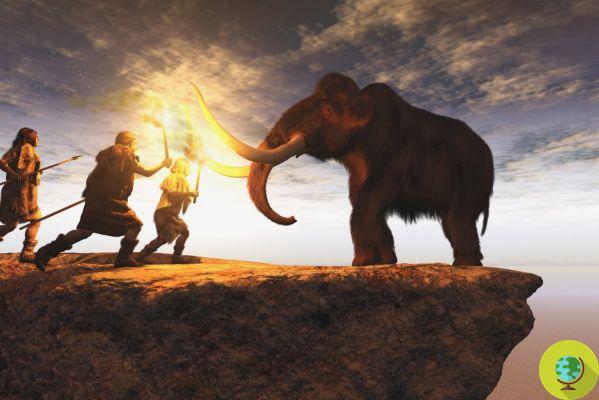
Extinction of large animals correlates with the growth of the human brain, according to a new study in humans
He is about to end up run over, his mother saves himIt has always been our fault. The human impact on the Earth and its inhabitants, whether rational or not, dictated by the survival instinct or not, has been affecting Nature for millennia. Now, a new study by Tel Aviv University scientists seems to have shown that humans developed as hunters of large animals, causing their ultimate extinction. After that, their brains began to grow in volume, which benefited their cognitive abilities.
The new article by Dr. Miki Ben-Dor and Prof. Ran Barkai of the Department of Archeology Jacob M. Alkow of Tel Aviv University therefore proposes a unique and original explanation for the physiological, behavioral and cultural evolution of the human species, from its first appearance about two million years ago, to the agricultural revolution (around 10.000 BC).
According to the document published in the Quaternary Jorunal, since man has become hunter of large animals, causing their extinction, his brain began to grow to accommodate hunting for smaller, faster animals. In this way, the human being has developed higher cognitive abilities, highlighted by the most evident evolutionary change: the growth of the brain volume from 650 cc to 1.500 cc.
So far, there hasn't been a single and compelling explanation capable of explaining this phenomenon. In recent years, more and more evidence has been found that humans have played an important role in the extinction of large animals. As a result, he had to adapt to smaller game hunting, first in Africa and then in all other parts of the world. On the African continent when humans first appeared about 2,6 million years ago, the average size of land mammals was around 500 kg. Shortly before the advent of agriculture, that number had dropped dramatically by 90%.
According to the researchers, the decrease in the size of game and the need to hunt small and fast animals have forced humans to hone their cunning, an evolutionary process that required an increase in the volume of the brain and which in the long run also led to the development of a language useful for exchanging information on prey. According to the new study, these abilities all had one goal: the conservation of body energy.
For scientists, during most of their evolution, early humans were apex predators specializing in hunting large animals. Accounting for the majority of available biomass, these animals provided humans with high levels of fat, an essential energy source, and allowed for greater energy return than smaller game. In the past, six different elephant species lived in Africa, making up more than half of the biomass of all herbivores hunted by humans. But early evidence found in the eastern part of the continent seems to indicate that homo sapiens only emerged there after a significant decline in the number of elephant species.
"We relate theincrease in the volume of the human brain with the need to become smarter hunters, ”explains Dr. Ben-Dor. “For example, the need to hunt dozens of gazelles instead of one elephant generated prolonged evolutionary pressure on the brain functions of humans, who were now consuming much more energy in both movement and thought processes. Hunting small animals, constantly threatened by predators and therefore very quick to take off, requires a physiology suitable for hunting and more sophisticated tools. Cognitive activity also increases as rapid detection requires rapid decision making, based on phenomenal knowledge of animal behavior, information that needs to be stored in larger memory. "
It also emerged that towards the end of the Stone Age, as animals got even smaller, humans had to devote more energy to hunting than they could get. This coincides with the agricultural revolution. As humans moved into permanent settlements and became farmers, their brain size decreased to the current volume of 1300-1400cc.
“While the chimpanzee brain, for example, has remained stable for 7 million years, the human brain has tripled, reaching its maximum size around 300.000 years ago. In addition to the volume of the brain, evolutionary pressure has induced humans to use language, fire and sophisticated tools such as bow and arrow, adapting their arms and shoulders to throwing tasks and their body to prolonged pursuit "added the prof. Barkai.
Unfortunately, while this allowed humans to evolve to survive, it caused the mass extinction of large animals. A constant that for the scientists of Tel Aviv is anything but coincidental.
“Wherever humans appeared, be it homo erectus or homo sapiens, we see, sooner or later, the mass extinction of large animals. Addiction to large animals had its price, ”the scientists conclude.
History still repeats itself today, but this time extinction is not linked to our survival. Animals, large and small, are becoming extinct due to human pressures on their habitats.
Sources of reference: Quaternary Journal, Phys.org
READ also:
- "Close to the sixth mass extinction". New study reveals that we are on the brink
- About 250 million years ago greenhouse gases caused the mass extinction event that wiped out nearly all life on Earth


























